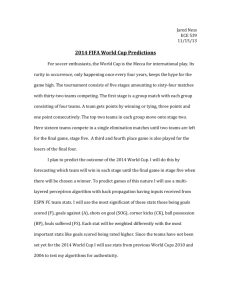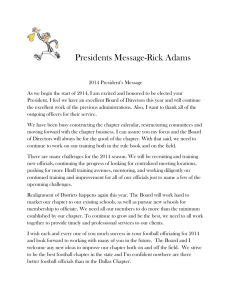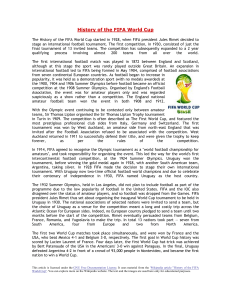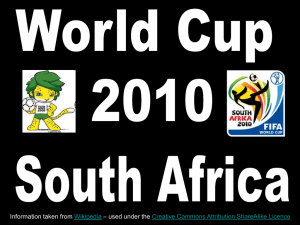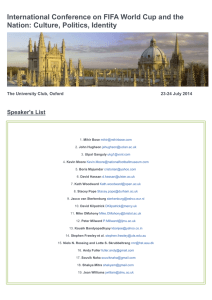GLOBAL FOOTBALL ECONOMY
advertisement
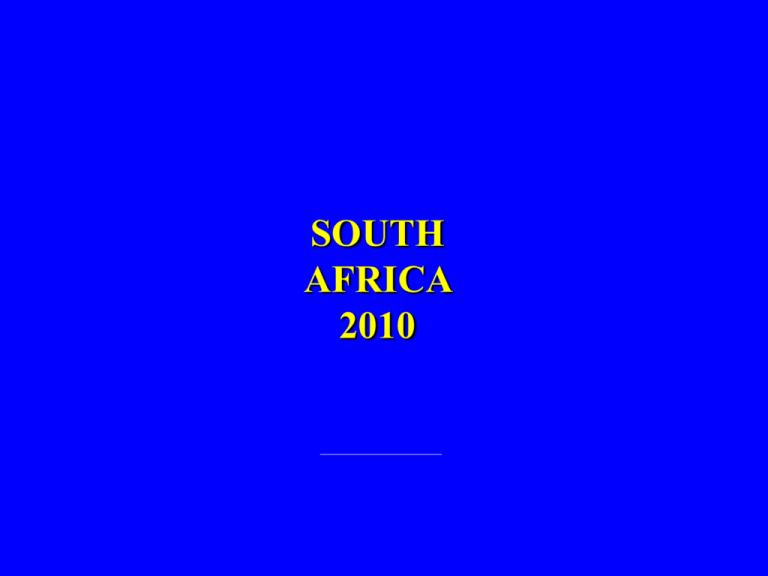
SOUTH AFRICA 2010 Contents Global Football Economy The Event Planning Cities & Infrastructure Legislative timetable SOUTH AFRICA: AN AFRICAN WORLD CUP A LAND OF INFINITE POSSIBILITIES Where else can you •feel nature’s beauty •experience first-world technology •face a fiery passion for sport, and •live the world’s only political miracle GLOBAL FOOTBALL ECONOMY - U$D 360 Billion MANCHESTER UNITED SUCCESS -$317m in sales: 40% to global market -Expand global fan base through exhibition matches DIFFICULT INDUSTRY -Real Madrid : $42m for Beckham – ended only 4th in League after spending $86m for Zidane -2003 – Abrahamovitch paid $230m for Chelsea & players GLOBAL FOOTBALL DOMINANCE - TV 70 60 62 61 57 50 49 % 47 46 40 Football Tennis 30 Baseball 28 25 20 Basketball 28 10 12 8 0 0 USA 0 0 China Japan Country 6 0 EU THE 3 HISTORICAL PERIODS OF THE WORLD CUP PRE-1990 POST-1990 2010 GERMANY 1974 GERMANY 2006 SOUTH AFRICA # OF FIFA MEMBERS ENTERING WORLD CUP COMPETITION 99 197 205 NUMBER OF PRELIMINARY MATCHES 226 857 881 NUMBER OF TEAMS IN WORLD CUP FINAL 16 32 32 NUMBER OF FINALS IN WORLD CUP MATCHES 38 64 64 1.7 million 3 million 2.78 million NUMBER OF SPECTATORS Contents Global Football Economy The Event Planning Cities & Infrastructure Legislative timetable THE EVENT •64 Matches •32 Teams •28 – 43 Days •13 Stadia •2.78 million tkts to be sold •40 Billion TV Audience •200 Viewing Hours WORLD CUP TICKET SALES WC EVENT # of MATCHES # of TICKETS (mn) PRESTIGE TICKETS % of PRESTIGE TICKETS % of TOTAL TICKETS SOLD AVG TICKET PRICE (CHF) TOTAL REVENUE ($ mn) 1994 USA 52 3.60 360,000 10.0% 100% 459 125 1998 France 64 2.6 216,000 8.5% 100% 1,300 186 2002 – Korea Japan 64 3.2 85,000 3.4% 100% 1,850 150 – 200 (est.) 2006 – Germany (proj) 64 3.46 346,000 10.0% 100% 1,926 N/A 2010 – South Africa 64 2.78 333,600 12.0% 89% N/A N/A THE EVENT: FOOTBALL FANS SPEND • Licensed merchandise • Transport • Meals • Accommodation • Entertainment TOTAL SPECTATOR SPEND R9.8 BILLION Contents Global Football Economy The Event Planning Cities & Infrastructure Legislative timetable To deliver a World Class 2010 FIFA World CupTM four key pillars need to be built. Social Legacy is a high priority on the Government’s agenda Pres. Mbeki’s State of the Nation Address Three Platforms Four Key Pillars M E G A E V E N T S A S S O C I A T I O N First Economy T E A M S S O C I A L Second Economy Social Security Net World class Mega Event competencies and delivery A stable image with good governance and financial integrity with strong corporate and government relationships World class competitive teams in all age groups Social upliftment across key communities Objectives • Encourage growth and development of First Economy – formal economy (e.g. raise the rate of investment, reduce the cost of doing business in SA, speed up skills development) • Address challenges of Second Economy – informal economy (e.g. launch Expanded Public Works Programme, improve financing related to the Urban Renewal and Rural Development Programmes, improve micro-crediting, increase support of agricultural activities) • Build a Social Security Net to meet the objective of poverty alleviation (e.g. new agency to improve social grant systems, increase number of children eligible for child support, and implement school nutrition programmes) Core response to the struggle against poverty and underdevelopment Through improved football development SAFA will contribute to social upliftment (e.g. skills transfer, improved funding) The 2010 FIFA World CupTM offers a unique opportunity for South Africa to advance the three Platforms set out in President Mbeki’s State of Nation address Core response to the struggle against poverty and underdevelopment Pres. Mbeki’s Three Platforms Potential Benefits to be derived from 2010 Expanded partnerships with government to promote growth and economic development First Economy Event is expected to generate 21 billion rand into the economy, with direct spending estimated at 12.7 billion rand Increase in Tourism Tournament expected to attract 400,000 visitors to the country during its 43 day duration Improvement of infrastructure for long-term growth Upgrading as well as the building of new stadiums in the country Transportation infrastructure Creation of new jobs and improving sustainable livelihoods More than 160,000 jobs are expected to be created from hosting the event Second Economy Accelerating BEE by procurement and sourcing policies Economic benefits will lead to greater self-sufficiency of citizens – developing Small Business sector Transfer of skills and training of key people Ama 2010 and FIFA Secondments and Observers Development of strong regional identity Collaboration with First Nations Social Security Net Upgrading of safety and security by increasing number of police force High-profile example of potential to generate economic growth, while respecting environmental sustainability Promoting sports development and healthy lifestyles and providing education related to 2010 Awareness of 2010 and implementation of school nutritional programmes Critical Success Factors of healthy lifestyles for sportsmen – address HIV/AIDS Geography of 2010 participating nations A holistic and comprehensive approach is needed to successfully stage the event which will ensure long term Economic Impact Venues & Infrastructure IT, Internet & Telecom Solution • • • • • • • • • Architecture & Integration Event systems Internet Hardware and software Testing & technical rehearsals Event network (voice and data) Network equipment & cabling Telephones and fax machines Wireless • • • • • • • • Venues Accommodation International media center Hotels Airports Rail and bus stations Conversion to municipal use Venue services (waste, food etc) • • • • Sports management Opening & Closing/other events Visitor services Accreditation Volunteer training and coordination Officials Cultural program Security General staff/management services • • • • • Sponsor (ViK) Management Marketing & advertising Licensing Rights Protection Ticketing & Sales — International & Domestic — Merchandise & Accommodation Communications • Media operations and Production • Hospitality Transportation and Logistics Event Co-ordination • • • • • Marketing, Sponsorship & Media Economic Impact • Direct Benefits — Event specific (Broadcast rights, Tickets, Licensing) — Induced (Tourism, Local Business, Tax Revenues) • Indirect Benefits — Employment from construction, tourism, and event-related jobs • Transportation infrastructure • Public transportation • Transportation planning — Officials — General public • Transportation operations • Warehousing and logistics • Materials management
